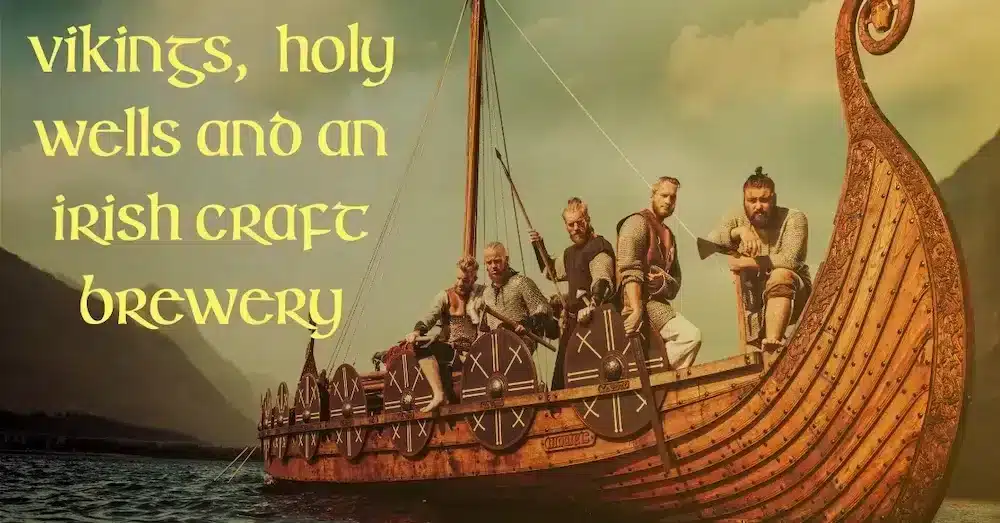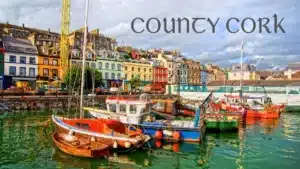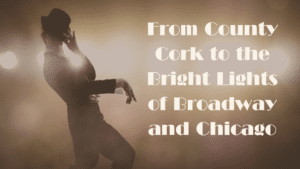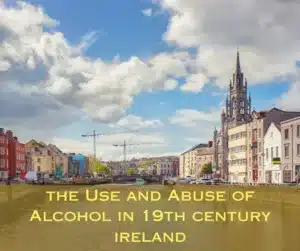Vikings, Irish Holy Wells and a Craft Brewery
We’re going to dive a little deeper into the subject of Irish well water today - encompassing the Vikings, the brewing of beer in Ireland and a little urban history along the way.

Cork is the closest city to where I live in Ireland and like many other Irish cities, it was built at a place where a river meets the sea. Also, like many other Irish cities it was founded (or at least developed) by the Vikings. When the Vikings visited Ireland for the first time, the island was a land of gaelic tribes who lived in clusters in the open countryside or sometimes close to a monastic settlement.
The Vikings Arrive in Ireland.
The Vikings used the rivers to penetrate deeper into our island and raid many of those early monasteries and churches – returning back to Scandinavia for the winter. Over time, they started to shelter over-winter at the mouth of our rivers – building wooden shelters around a clean spring source and near to some land where they could grow food. They traded with the local Irish and eventually intermarried. The early towns of Cork, Limerick, Dublin, Wexford, Waterford and Wicklow developed in this way and became known in the history books as “Hiberno-Norse” settlements.
The vikings travelled a short distance up the River Lee from the coast so they could harbour safely, have access to clean water and arable land – and a safe mooring for their boats. That is how the city of Cork was established.
Holy Wells, Monks and The Brewing of Beer.
We also have a great tradition of “Holy Wells” in Ireland. The countryside is dotted with all sorts of wells – many associated with a particular saint. These wells were said to offer curative powers for those who drink the water – or rub it on a particular part of their anatomy. Of course, many of these wells were located in what became our towns and cities – towns and cities that were especially affected by disease and plague. You can imagine how the reputation of these clean sources of fresh water was enhanced in those times of sickness and plague. It was noticed that if you drank water from a particular well that you stayed healthy or recovered – but that if drank from a different source (e.g. a stream) you often died.
Because they were mostly associated with a particular saint, the religious orders often established themselves near to these wells – especially in areas of larger populations such as our towns and cities. By the 1200s, religious orders like the Franciscans and Cistercians had established friaries in many of the towns and cities of Europe – including the island of Ireland. These orders had to sustain themselves, welcome visitors and make some money to survive. The brewing of beer from the clean waters of their wells became a major source of safe sustenance and profit. It was a bonus that well water was said to have healing powers – but in any case you could trust beer made from clean well water versus everyday drinking water sources.
By the time the 1500s came around, many European monasteries were being dissolved and the brewing of beer moved more towards secular commercial companies – but using the same clean water sources enjoyed by those earlier religious communities.
If you ever have a chance to visit Cork city in the future, travel upriver just a little from the harbour. You will come to a place in the old city where the Vikings would have established the original settlement near a clean source of water. One of these sources was later used by the Franciscan order who established a friary just at that spot. The very place eventually became a craft brewery – appropriately called the “Franciscan Well”.
Walk into the brewery to the courtyard at the back – you’ll discover a closed-in well that would have been located in the middle of the original friary which would have been used for drinking water and, of course, brewing beer. Go back before that – and it was likely to have been a source of water for our visiting Viking friends.
When you get there – have a pint of beer and realise that you are now really drinking from the source. Give me a call and I might nip down there to join you for one myself. Together we’ll say that age-old Irish toast – “Sláinte” (pronounced “slawn-cha)!
That’s it for this week. As ever, do feel free to share your own family surnames, places and stories.
Slán for now,
Mike.







Only Plus Members can comment - Join Now
If you already have an account sign in here.